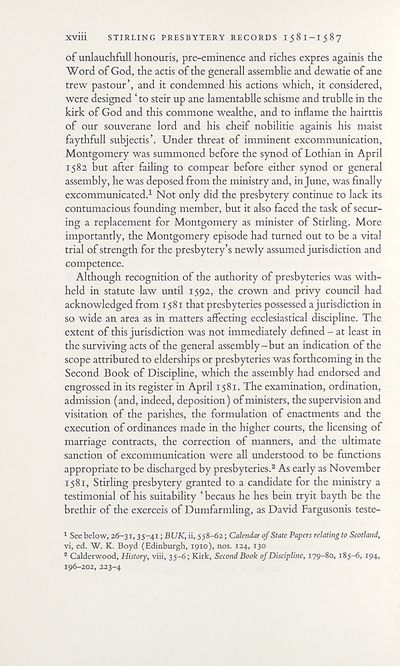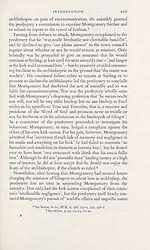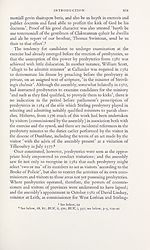Series 4 > Stirling Presbytery Records 1581-1587
(23) Page xviii
Download files
Complete book:
Individual page:
Thumbnail gallery: Grid view | List view

Xviii STIRLING PRESBYTERY RECORDS I581-I587
of unlauchfull honouris, pre-eminence and riches expres againis the
Word of God, the actis of the generall assemblie and dewatie of ane
trew pastour’, and it condemned his actions which, it considered,
were designed ‘ to steir up ane lamentablle schisme and trublle in the
kirk of God and this commone wealthe, and to inflame the hairttis
of our souverane lord and his cheif nobilitie againis his maist
faythfull subjectis’. Under threat of imminent excommunication,
Montgomery was summoned before the synod of Lothian in April
1582 but after failing to compear before either synod or general
assembly, he was deposed from the ministry and, in June, was finally
excommunicated.1 Not only did the presbytery continue to lack its
contumacious founding member, but it also faced the task of secur¬
ing a replacement for Montgomery as minister of Stirling. More
importantly, the Montgomery episode had turned out to be a vital
trial of strength for the presbytery’s newly assumed jurisdiction and
competence.
Although recognition of the authority of presbyteries was with¬
held in statute law until 1592, the crown and privy council had
acknowledged from 1581 that presbyteries possessed a jurisdiction in
so wide an area as in matters affecting ecclesiastical discipline. The
extent of this jurisdiction was not immediately defined - at least in
the surviving acts of the general assembly-but an indication of the
scope attributed to elderships or presbyteries was forthcoming in the
Second Book of Discipline, which the assembly had endorsed and
engrossed in its register in April 1581. The examination, ordination,
admission (and, indeed, deposition) of ministers, the supervision and
visitation of the parishes, the formulation of enactments and the
execution of ordinances made in the higher courts, the licensing of
marriage contracts, the correction of manners, and the ultimate
sanction of excommunication were all understood to be functions
appropriate to be discharged by presbyteries.2 As early as November
1581, Stirling presbytery granted to a candidate for the ministry a
testimonial of his suitability ‘ becaus he hes bein tryit bayth be the
brethir of the exerceis of Dumfarmling, as David Fargusonis teste-
1 See below, 26-31,35-41; BUK, ii, 558-62; Calendar of State Papers relating to Scotland,
vi, ed. W. K. Boyd (Edinburgh, 1910), nos. 124, 130
2 Calderwood, History, viii, 35-6; Kirk, Second Book of Discipline, 179-80, 185-6, 194,
196-202, 223-4
of unlauchfull honouris, pre-eminence and riches expres againis the
Word of God, the actis of the generall assemblie and dewatie of ane
trew pastour’, and it condemned his actions which, it considered,
were designed ‘ to steir up ane lamentablle schisme and trublle in the
kirk of God and this commone wealthe, and to inflame the hairttis
of our souverane lord and his cheif nobilitie againis his maist
faythfull subjectis’. Under threat of imminent excommunication,
Montgomery was summoned before the synod of Lothian in April
1582 but after failing to compear before either synod or general
assembly, he was deposed from the ministry and, in June, was finally
excommunicated.1 Not only did the presbytery continue to lack its
contumacious founding member, but it also faced the task of secur¬
ing a replacement for Montgomery as minister of Stirling. More
importantly, the Montgomery episode had turned out to be a vital
trial of strength for the presbytery’s newly assumed jurisdiction and
competence.
Although recognition of the authority of presbyteries was with¬
held in statute law until 1592, the crown and privy council had
acknowledged from 1581 that presbyteries possessed a jurisdiction in
so wide an area as in matters affecting ecclesiastical discipline. The
extent of this jurisdiction was not immediately defined - at least in
the surviving acts of the general assembly-but an indication of the
scope attributed to elderships or presbyteries was forthcoming in the
Second Book of Discipline, which the assembly had endorsed and
engrossed in its register in April 1581. The examination, ordination,
admission (and, indeed, deposition) of ministers, the supervision and
visitation of the parishes, the formulation of enactments and the
execution of ordinances made in the higher courts, the licensing of
marriage contracts, the correction of manners, and the ultimate
sanction of excommunication were all understood to be functions
appropriate to be discharged by presbyteries.2 As early as November
1581, Stirling presbytery granted to a candidate for the ministry a
testimonial of his suitability ‘ becaus he hes bein tryit bayth be the
brethir of the exerceis of Dumfarmling, as David Fargusonis teste-
1 See below, 26-31,35-41; BUK, ii, 558-62; Calendar of State Papers relating to Scotland,
vi, ed. W. K. Boyd (Edinburgh, 1910), nos. 124, 130
2 Calderwood, History, viii, 35-6; Kirk, Second Book of Discipline, 179-80, 185-6, 194,
196-202, 223-4
Set display mode to:
![]() Universal Viewer |
Universal Viewer | ![]() Mirador |
Large image | Transcription
Mirador |
Large image | Transcription
Images and transcriptions on this page, including medium image downloads, may be used under the Creative Commons Attribution 4.0 International Licence unless otherwise stated. ![]()
| Scottish History Society volumes > Series 4 > Stirling Presbytery Records 1581-1587 > (23) Page xviii |
|---|
| Permanent URL | https://digital.nls.uk/126646431 |
|---|
| Description | Over 180 volumes, published by the Scottish History Society, containing original sources on Scotland's history and people. With a wide range of subjects, the books collectively cover all periods from the 12th to 20th centuries, and reflect changing trends in Scottish history. Sources are accompanied by scholarly interpretation, references and bibliographies. Volumes are usually published annually, and more digitised volumes will be added as they become available. |
|---|


